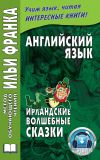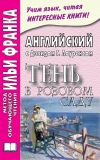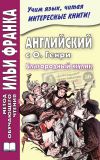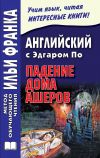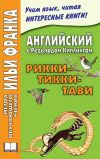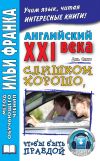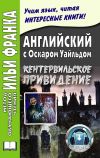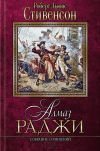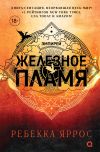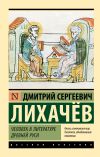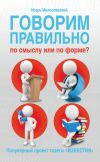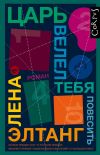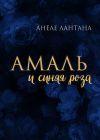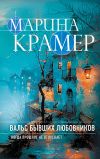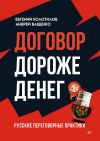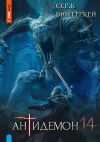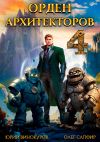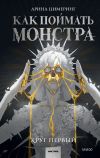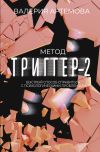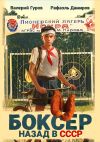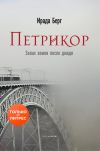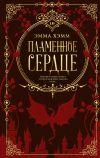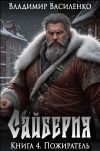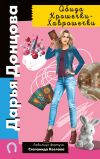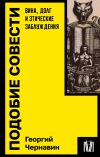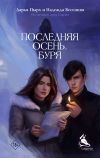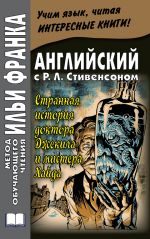
Автор книги: Роберт Стивенсон
Жанр: Иностранные языки, Наука и Образование
Возрастные ограничения: +16
сообщить о неприемлемом содержимом
Текущая страница: 3 (всего у книги 19 страниц) [доступный отрывок для чтения: 5 страниц]
II
Search for Mr. Hyde
(Поиски мистера Хайда)
That evening Mr. Utterson came home to his bachelor house in sombre spirits (тем вечером мистер Аттерсон вернулся в свой холостяцкий дом в мрачном настроении; bachelor – холостяк; spirit – душа, дух; настроение, душевное состояние), and sat down to dinner without relish (и он сел ужинать = приступил к ужину без аппетита; relish – удовольствие, наслаждение). It was his custom of a Sunday (по воскресеньям он имел обыкновение), when this meal was over (поужинав: «когда его прием пищи был окончен»; to be over – окончиться, завершиться), to sit close by the fire (сидеть у камина; fire – огонь; печь, камин; close – близко, рядом, около), a volume of some dry divinity on his reading desk (с томиком какого-нибудь сухого богословского труда на подставке: «пюпитре»; dry – сухой; скучный, неинтересный; divinity – божественность; богословие), until the clock of the neighbouring church rang out the hour of twelve (/и читал его/, пока часы соседской церкви не отбивали полночь; to ring – звенеть, звучать; звонить), when he would go soberly and gratefully to bed (после чего он неторопливо и с чувством выполненного долга отправлялся спасть; sober – трезвый; сдержанный, спокойный; grateful – благодарный, признательный). On this night, however, as soon as the cloth was taken away (однако в этот вечер, как только приборы были убраны со стола /после ужина/; cloth – ткань, сукно; скатерть), he took up a candle and went into his business room (он взял подсвечник: «свечу» и отправился в свой кабинет). There he opened his safe (там он открыл сейф), took from the most private part of it a document (достал из тайника в нем: «из самой потаенной части его» некий документ; private – частный; тайный, не доступный для всех) endorsed on the envelope as Dr. Jekyll’s Will (на конверте которого было написано: «Завещание доктора Джекила»; to endorse – расписываться на обороте документа; делать отметку /на документе/), and sat down with a clouded brow to study its contents (и, усевшись, с мрачным видом, стал изучать его содержание; to cloud – покрывать облаками, тучами; омрачать; cloud – облако, туча; brow – бровь; выражение лица).

That evening Mr. Utterson came home to his bachelor house in sombre spirits, and sat down to dinner without relish. It was his custom of a Sunday, when this meal was over, to sit close by the fire, a volume of some dry divinity on his reading desk, until the clock of the neighbouring church rang out the hour of twelve, when he would go soberly and gratefully to bed. On this night, however, as soon as the cloth was taken away, he took up a candle and went into his business room. There he opened his safe, took from the most private part of it a document endorsed on the envelope as Dr. Jekyll’s Will, and sat down with a clouded brow to study its contents.
The will was holograph (завещание было написано собственноручно /мистером Джекилом/; will – воля, сила воли; завещание; holograph – собственноручно написанный документ); for Mr. Utterson, though he took charge of it now that it was made (так как мистер Аттерсон, хотя он и принял этот документ на хранение теперь, когда он был уже составлен; to take charge of – заботиться /о ком-либо/; брать на хранение), had refused to lend the least assistance in the making of it (отказался оказать малейшее содействие в его составлении; to lend – давать взаймы; придавать, оказывать; to assist – помогать, содействовать); it provided not only that, in case of the decease of Henry Jekyll (в нем не только предусматривалось, что в случае кончины Генри Джекила; to provide – снабжать; предусматривать), M. D., D. C. L., LL. D., F. R. S., &c. (доктора медицины, доктора гражданского права, доктора юридических наук, члена Королевского общества и т. д.; M. D. – Doctor of Medicine; D. C. L. – Doctor of Civil Law; LL. D. – Doctor of Laws; F. R. S. – Fellow of the Royal Society), all his possessions were to pass into the hands of his “friend and benefactor Edward Hyde (все его имущество переходило в руки его «друга и благодетеля Эдварда Хайда»)”; but that in case of Dr. Jekyll’s “disappearance or unexplained absence for any period exceeding three calendar months (но и /указывалось/, что в случае «исчезновения или необъяснимого отсутствия доктора Джекила на срок, превышающий три календарных месяца»),” the said Edward Hyde should step into the said Henry Jekyll’s shoes without further delay (вышеупомянутый Эдвард Хайд должен вступить в наследство вышеозначенного Генри Джекила без дальнейших проволочек; to step into smb.’s shoes – занять чье-либо место; унаследовать что-либо), and free from any burthen or obligation (и освобождается от каких-либо обременений или обязательств; burthen = burden – ноша; бремя), beyond the payment of a few small sums to the members of the doctor’s household (кроме выплаты нескольких небольших сумм слугам доктора; member – член; household – семья, домашние /включая слуг/).

The will was holograph; for Mr. Utterson, though he took charge of it now that it was made, had refused to lend the least assistance in the making of it; it provided not only that, in case of the decease of Henry Jekyll, M. D., D. C. L., LL. D., F. R. S., &c., all his possessions were to pass into the hands of his “friend and benefactor Edward Hyde”; but that in case of Dr. Jekyll’s “disappearance or unexplained absence for any period exceeding three calendar months,” the said Edward Hyde should step into the said Henry Jekyll’s shoes without further delay, and free from any burthen or obligation, beyond the payment of a few small sums to the members of the doctor’s household.
This document had long been the lawyer’s eyesore (этот документ давно оскорблял взор нотариуса = был источником мучений для нотариуса; eyesore – что-либо противное, оскорбительное /для глаза/; sore – болячка, рана, язва). It offended him both as a lawyer (он оскорблял его и как нотариуса) and as a lover of the sane and customary sides of life (и как приверженца здравых и привычных сторон жизни = издавна сложившихся разумных традиций; lover – любитель; приверженец; custom – привычка; обычай), to whom the fanciful was the immodest (для которого причуды казались неприличными: «причудливое было нескромным»; fancy – причуда; modest – скромный). And hitherto it was his ignorance of Mr. Hyde that had swelled his indignation (и до сих пор именно то, что он не знал мистера Хайда, переполняло его негодованием; ignorance – невежество; неведение, незнание; to swell – надуваться; быть переполненным чувствами); now, by a sudden turn, it was his knowledge (а теперь, вследствие такого неожиданного поворота /дела/ – осведомленность /о нем/; turn – оборот; перемена, изменение /состояния/). It was already bad enough when the name was but a name (/ситуация/ уже была достаточно скверной, когда это имя было просто именем) of which he could learn no more (о котором он не мог узнать ничего больше). It was worse when it began to be clothed upon with detestable attributes (теперь, когда оно начало облекаться такими отвратительными качествами, стало еще хуже; to clothe – одевать; облекать); and out of the shifting, insubstantial mists that had so long baffled his eye (и вот из зыбкой, призрачной мглы, так долго застилавшей его глаза; to shift – перемещать, сдвигать, передвигать; insubstantial – иллюзорный, нереальный; substantial – действительный, материальный, реальный, реально существующий; substance – вещество; сущность; to baffle – озадачивать; мешать, препятствовать), there leaped up the sudden, definite presentment of a fiend (перед ним вдруг возникло определенное изображение злого демона; to leap – прыгать, скакать; внезапно появляться; presentment – предъявление, предоставление; изложение, описание; изображение).


This document had long been the lawyer’s eyesore. It offended him both as a lawyer and as a lover of the sane and customary sides of life, to whom the fanciful was the immodest. And hitherto it was his ignorance of Mr. Hyde that had swelled his indignation; now, by a sudden turn, it was his knowledge. It was already bad enough when the name was but a name of which he could learn no more. It was worse when it began to be clothed upon with detestable attributes; and out of the shifting, insubstantial mists that had so long baffled his eye, there leaped up the sudden, definite presentment of a fiend.
“I thought it was madness (я думал, что это безрассудство; madness – душевное расстройство; безумие, безрассудство),” he said, as he replaced the obnoxious paper in the safe (сказал он, возвращая обратно в сейф ненавистный документ; obnoxious – оскорбительный; противный, отвратительный; paper – бумага; документ); “and now I begin to fear it is disgrace (а теперь я начинаю бояться, что здесь кроется бесчестье; disgrace – позор, бесчестье).”
With that he blew out his candle (с этими словами он задул свечу; to blow – дуть), put on a great coat, and set forth in the direction of Cavendish Square (надел пальто и отправился в направлении Кавендиш-Сквер), that citadel of medicine (этой цитадели медицины = к этому средоточию медицинских светил), where his friend, the great Dr. Lanyon, had his house and received his crowding patients (где располагался дом его друга, знаменитого доктора Лэньона, и где тот принимал своих многочисленных пациентов; to crowd – толпиться, тесниться; собираться, скапливаться; crowd – толпа). “If any one knows, it will be Lanyon (если кто-то и может в этом разобраться, так это Лэньон; to know – знать; обладать знаниями, разбираться),” he had thought (подумал он).

“I thought it was madness,” he said, as he replaced the obnoxious paper in the safe; “and now I begin to fear it is disgrace.”
With that he blew out his candle, put on a great coat, and set forth in the direction of Cavendish Square, that citadel of medicine, where his friend, the great Dr. Lanyon, had his house and received his crowding patients. “If any one knows, it will be Lanyon,” he had thought.
The solemn butler knew and welcomed him (важного вида дворецкий узнал его и радушно встретил; solemn – серьезный; напыщенный, важничающий); he was subjected to no stage of delay (он был избавлен от ожидания: «он не был подвергнут никакому периоду ожидания»; to subject – подчинять; подвергать; stage – фаза, период), but ushered direct from the door to the dining-room (а был сопровожден /дворецким прямиком от входной двери/ в столовую; to usher – провожать, сопровождать; вводить; усаживать, показывать места), where Dr. Lanyon sat alone over his wine (где доктор Лэньон сидел в одиночестве, допивая вино: «над своим вином»). This was a hearty (это был радушный), healthy (здоровый), dapper (щеголевато одетый; dapper – опрятный, аккуратный; щеголеватый; элегантный /о человеке, его одежде/), red-faced gentleman (румяный джентльмен), with a shock of hair prematurely white (с копной преждевременно поседевших волос; shock – копна, скирда; копна /волос/), and a boisterous and decided manner (шумный и решительный: «с манерами шумными и не допускающими возражений»; decided – решительный, твердый; to decide – решать, принимать решение; manner – манера, поведение). At sight of Mr. Utterson, he sprang up from his chair (при виде мистера Аттерсона он вскочил со своего кресла) and welcomed him with both hands (и радушно /протянул ему/ для приветствия обе руки). The geniality, as was the way of the man, was somewhat theatrical to the eye (радушие, которое было столь присуще доктору, казалось немного театральным: «было немного театральным для взора»; way – путь, дорога; образ действия, манера поведения); but it reposed on genuine feeling (но оно основывалось на искреннем чувстве; to repose – отдыхать; основываться, держаться /на чем-либо/). For these two were old friends, old mates both at school and college (потому что эти двое были старыми друзьями, старыми сотоварищами и в школе, и в колледже; mate – товарищ /по работе/; приятель), both thorough respecters of themselves and of each other (оба они испытывали глубокое уважение как к себе лично, так и друг к другу: «оба – полнейшие ‘уважатели’ самих себя и друг друга»; thorough – исчерпывающий, полный; законченный, полный, завершенный), and, what does not always follow, men who thoroughly enjoyed each other’s company (и, что не всегда следует /из вышесказанного/, оба они чрезвычайно любили общество друг друга; to follow – следовать, идти /за кем-либо, чем-либо/; следовать, логически вытекать из).

The solemn butler knew and welcomed him; he was subjected to no stage of delay, but ushered direct from the door to the dining-room, where Dr. Lanyon sat alone over his wine. This was a hearty, healthy, dapper, red-faced gentleman, with a shock of hair prematurely white, and a boisterous and decided manner. At sight of Mr. Utterson, he sprang up from his chair and welcomed him with both hands. The geniality, as was the way of the man, was somewhat theatrical to the eye; but it reposed on genuine feeling. For these two were old friends, old mates both at school and college, both thorough respecters of themselves and of each other, and, what does not always follow, men who thoroughly enjoyed each other’s company.
After a little rambling talk (после недолгого разговора о том о сем; rambling – бродячий; хаотичный, бессвязный /о речи/; to ramble – бродить, блуждать), the lawyer led up to the subject which so disagreeably preoccupied his mind (нотариус постепенно перешел к предмету, который столь неприятно занимал все его мысли; to lead up – вести куда-либо; наводить /разговор и т. п./, подводить /к чему-либо/; to preoccupy – занимать, поглощать /внимание/).
“I suppose, Lanyon (пожалуй, Лэньон; to suppose – предполагать),” said he, “you and I must be the two oldest friends that Henry Jekyll has (мы с вами, должно быть, самые старые друзья Генри Джекила)?”
“I wish the friends were younger (хотелось бы, чтобы друзья были помоложе = жаль, что не самые молодые),” chuckled Dr. Lanyon (усмехнулся/хмыкнул доктор Лэньон; to chuckle – издать смешок). “But I suppose we are (но, полагаю, так и есть). And what of that (и что из этого)? I see little of him now (я его теперь редко вижу).”
“Indeed (в самом деле)?” said Utterson. “I thought you had a bond of common interest (а я думал, что вас связывают общие интересы; bond – узы, связь).”

After a little rambling talk, the lawyer led up to the subject which so disagreeably preoccupied his mind.
“I suppose, Lanyon,” said he, “you and I must be the two oldest friends that Henry Jekyll has?”
“I wish the friends were younger,” chuckled Dr. Lanyon. “But I suppose we are. And what of that? I see little of him now.”
“Indeed?” said Utterson. “I thought you had a bond of common interest.”
“We had (связывали: «мы имели /связь общими интересами/»),” was the reply (последовал ответ). “But it is more than ten years since Henry Jekyll became too fanciful for me (но вот уже более десяти лет прошло, как Генри Джекил стал /казаться/ мне слишком уж странным; fanciful – с причудами; фантастический, нереальный; fancy – иллюзия; галлюцинация; фантазия; мысленный образ; каприз, прихоть, причуда). He began to go wrong, wrong in mind (он начал терять рассудок; wrong – неправильный, ошибочный); and though, of course, I continue to take an interest in him for old sake’s sake as they say (и хотя, конечно же, я продолжаю интересоваться его делами, как говорится, во имя прошлого; for the sake of – ради), I see and I have seen devilish little of the man (я его вижу, да и видел, чертовски мало). Such unscientific balderdash (подобная антинаучная галиматья = подобный ненаучный вздор),” added the doctor, flushing suddenly purple (добавил доктор, внезапно побагровев; to flush – вспыхнуть, покраснеть; purple – пурпурный, багровый), “would have estranged Damon and Pythias (отдалила бы и самых неразлучных друзей = заставил бы даже Дамона отвернуться от Пифиаса; Damon and Pythias – /греч. миф./ Дамон и Пифиас, неразлучные друзья).”

“We had,” was the reply. “But it is more than ten years since Henry Jekyll became too fanciful for me. He began to go wrong, wrong in mind; and though, of course, I continue to take an interest in him for old sake’s sake as they say, I see and I have seen devilish little of the man. Such unscientific balderdash,” added the doctor, flushing suddenly purple, “would have estranged Damon and Pythias.”
This little spirit of temper was somewhat of a relief to Mr. Utterson (этот небольшой приступ ярости отчасти успокоил мистера Аттерсона; temper – нрав, характер; раздражительность, несдержанность; relief – облегчение, утешение). “They have only differed on some point of science (они просто разошлись во мнениях по какому-то научному вопросу; to differ – отличаться; расходиться во мнениях, не соглашаться),” he thought (подумал он); and being a man of no scientific passions (и, будучи человеком без научных увлечений = так как науки его нисколько не интересовали; passion – страсть; предмет страсти, увлечение) (except in the matter of conveyancing (за исключением вопросов, когда речь шла о переходе прав собственности на недвижимость; conveyance – перевозка, транспортировка; /юр./ передача собственности /особенно недвижимого имущества/ от одного лица другому, документ о такой передаче/; to convey – перевозить, переправлять; юр. передавать имущество, право) he even added (он даже добавил): “It is nothing worse than that (а, ничего страшного = ну, это пустяки)!” He gave his friend a few seconds to recover his composure (он выждал несколько секунд: «предоставил своему другу несколько секунд», чтобы тот пришел в себя; to recover – получать обратно; выздоравливать, приходить в себя; composure – спокойствие, самообладание; to compose – успокаивать: he composeed himself – он успокоился), and then approached the question he had come to put (а затем перешел к вопросу, ради которого он и пришел: «который он пришел задать»).
“Did you ever come across a protege of his – one Hyde (а вы когда-нибудь встречались с его протеже – неким Хайдом)?” he asked.
“Hyde?” repeated Lanyon (повторил Лэньон). “No. Never heard of him (никогда не слышал о нем). Since my time (с того времени, как я знаком с доктором Джекилем: «с моего времени»; time – время; пора, период времени, эпоха).”

This little spirit of temper was somewhat of a relief to Mr. Utterson. “They have only differed on some point of science,” he thought; and being a man of no scientific passions (except in the matter of conveyancing) he even added: “It is nothing worse than that!” He gave his friend a few seconds to recover his composure, and then approached the question he had come to put.
“Did you ever come across a protege of his – one Hyde?” he asked.
“Hyde?” repeated Lanyon. “No. Never heard of him. Since my time.”
That was the amount of information that the lawyer carried back with him to the great, dark bed (это была вся информация, которую нотариус принес с собой и /обдумывал, лежа в/ огромной темной кровати; amount – количество; все, весь объем) on which he tossed to and fro (в которой он ворочался с боку на бок; to toss – бросать; беспокойно метаться /во сне и т. п./; to and fro – с одного места на другое, туда и сюда), until the small hours of the morning began to grow large (до тех пор, пока поздняя ночь не превратилась в раннее утро; small hours – первые часы после полуночи; to grow – расти; становиться, делаться; large – большой, крупный; широкий). It was a night of little ease to his toiling mind (эта ночь принесла мало облегчения его напряженно работающему мозгу; ease – свобода, непринужденность; облегчение, прекращение /тревоги и т. п./; to toil – усиленно трудиться; выполнять тяжелую работу), toiling in mere darkness and besieged by questions (работающему в кромешной тьме и охваченному вопросами; mere – /усил./ сущий, настоящий; to besiege – осаждать; забрасывать /просьбами, вопросами и т. п./; siege – осада).
Six o’clock struck on the bells of the church that was so conveniently near to Mr. Utterson’s dwelling (часы на церкви, которая так удобно располагалась рядом с домом мистера Аттерсона, пробили шесть часов; to strike – ударять; бить /о часах/; bell – колокол; bells – колокола, куранты), and still he was digging at the problem (а он все еще продолжал /мучительно/ обдумывать эту проблему = ломал голову над этой загадкой; to dig – копать, рыть; докапываться /до чего-либо/, раскапывать, находить).

That was the amount of information that the lawyer carried back with him to the great, dark bed on which he tossed to and fro, until the small hours of the morning began to grow large. It was a night of little ease to his toiling mind, toiling in mere darkness and besieged by questions. Six o’clock struck on the bells of the church that was so conveniently near to Mr. Utterson’s dwelling, and still he was digging at the problem.
Hitherto it had touched him on the intellectual side alone (до сих пор она интересовала его только с интеллектуальной стороны = представляла для него только интеллектуальный интерес; hitherto – до настоящего времени, до сих пор; to touch – касаться, трогать; трогать, волновать); but now his imagination also was engaged, or rather enslaved (но теперь и его воображение оказалось вовлеченным или даже порабощенным /этой проблемой/; to engage – нанимать на работу; занимать, привлекать; slave – раб); and as he lay and tossed in the gross darkness of the night and the curtained room (и пока он лежал и ворочался в сгустившейся тьме ночи, в спальне с занавешенными окнами; gross – плотный, густой; curtain – занавеска, штора), Mr. Enfield’s tale went by before his mind in a scroll of lighted pictures (история, /рассказанная/ мистером Энфилдом, проходила перед его умственным /взором/ свитком с яркими картинами; to light – зажигать; освещать). He would be aware of the great field of lamps of a nocturnal city (вот он видел огромное поле фонарей ночного города; aware – осознающий, знающий /что-либо/, осведомленный /о чем-либо/); then of the figure of a man walking swiftly (затем фигуру быстро шагающего человека); then of a child running from the doctor’s (затем фигуру девочки, бегущей от врача); and then these met (затем они сталкивались; to meet – встречать; натолкнуться /на что-либо/), and that human Juggernaut trod the child down and passed on regardless of her screams (и вот этот безжалостный злой дух в человеческом обличии сбивал ребенка = девочку и проходил мимо, не обращая внимания на ее крики; to tread down – давить, топтать; to tread – ступать, шагать; regard – внимание, принятие во внимание, рассмотрение; regardless of – не обращая внимания; невзирая на; не считаясь с).

Hitherto it had touched him on the intellectual side alone; but now his imagination also was engaged, or rather enslaved; and as he lay and tossed in the gross darkness of the night and the curtained room, Mr. Enfield’s tale went by before his mind in a scroll of lighted pictures. He would be aware of the great field of lamps of a nocturnal city; then of the figure of a man walking swiftly; then of a child running from the doctor’s; and then these met, and that human Juggernaut trod the child down and passed on regardless of her screams.
Or else he would see a room in a rich house (или еще он видел комнату = спальню в богатом доме), where his friend lay asleep (где лежал спящим его друг /доктор Джекил/), dreaming and smiling at his dreams (видящий сны и улыбающийся /им/); and then the door of that room would be opened (а затем дверь той спальни открывалась), the curtains of the bed plucked apart, the sleeper recalled (полог кровати отдергивался в сторону, спящий просыпался; to pluck – срывать, собирать; дергать, тащить; apart – в стороне; в сторону; to recall – выводить /из какого-либо состояния/), and, lo! there would stand by his side a figure to whom power was given (и – подумать только! – рядом с ним стояла некая фигура, наделенная властью: «которой дана была власть»; power – сила, мощь; власть, могущество; lo – /уст./ вот! слушай! смотри! /тж. lo and behold!/), and even at that dead hour, he must rise and do its bidding (и даже в этот глухой час он должен был подняться и исполнять ее /фигуры/ приказания; dead – мертвый; глухой, унылый; to bid – /уст./ просить; приказывать).

Or else he would see a room in a rich house, where his friend lay asleep, dreaming and smiling at his dreams; and then the door of that room would be opened, the curtains of the bed plucked apart, the sleeper recalled, and, lo! there would stand by his side a figure to whom power was given, and even at that dead hour, he must rise and do its bidding.
The figure in these two phases haunted the lawyer all night (эта фигура в двух своих ипостасях преследовала нотариуса всю ночь напролет; phase – фаза, стадия; аспект, сторона; to haunt – часто посещать; преследовать, тревожить /о мыслях и т. п./); and if at any time he dozed over (и если в какой-то момент ему удавалось задремать), it was but to see it glide more stealthily through sleeping houses (то только для того, чтобы увидеть эту фигуру скользящей еще более крадучись по спящим домам; to glide – скользить; двигаться крадучись или бесшумно; stealthy – тайный, скрытный; stealth – хитрость, уловка), or move the more swiftly and still the more swiftly, even to dizziness (или движущейся все более и более поспешно, почти до головокружения; dizzy – испытывающий/чувствующий головокружение), through wider labyrinths of lamp-lighted city (по все более запутанным лабиринтам освещенного фонарями города; wide – широкий; хитрый, ловкий; to light – зажигать; освещать), and at every street corner crush a child and leave her screaming (и на каждом углу топчущей девочку и оставляющей ее /лежать на мостовой/ кричащей; to crush – давить, дробить). And still the figure had no face by which he might know it (и по-прежнему у этой фигуры не было лица, по которому он мог бы узнать ее); even in his dreams, it had no face (даже в его снах у нее не было лица), or one that baffled him and melted before his eyes (или /было такое лицо/, которое озадачивало его и исчезало у него на глазах; to melt – таять; исчезать); and thus it was that there sprang up and grew apace in the lawyer’s mind (и так вот случилось, что в голове нотариуса возникло и стремительно разрослось = окрепло; to spring – скакать; появляться, возникать) a singularly strong, almost an inordinate, curiosity to behold the features of the real Mr. Hyde (необыкновенно сильное, почти что непреодолимое любопытство = желание узреть лицо настоящего мистера Хайда; inordinate – беспорядочный; несдержанный, чрезмерный; features – черты лица).

The figure in these two phases haunted the lawyer all night; and if at any time he dozed over, it was but to see it glide more stealthily through sleeping houses, or move the more swiftly and still the more swiftly, even to dizziness, through wider labyrinths of lamp-lighted city, and at every street corner crush a child and leave her screaming. And still the figure had no face by which he might know it; even in his dreams, it had no face, or one that baffled him and melted before his eyes; and thus it was that there sprang up and grew apace in the lawyer’s mind a singularly strong, almost an inordinate, curiosity to behold the features of the real Mr. Hyde.
If he could but once set eyes on him (если бы он только один раз мог увидеть его: «поместить глаза на него»), he thought the mystery would lighten (он думал, что на тайну пролился бы свет) and perhaps roll altogether away (и, возможно, она совсем бы рассеялась; to roll away – откатывать/ся/; рассеиваться /о тумане и т. п./), as was the habit of mysterious things when well examined (как обычно случалось с таинственными явлениями при тщательном рассмотрении; habit – привычка, обыкновение; well – хорошо; тщательно). He might see a reason for his friend’s strange preference or bondage (call it which you please) (он смог бы понять причину странной привязанности или зависимости (называйте это как вам угодно) своего друга; preference – предпочтение; bondage – рабство; зависимость, кабала), and even for the startling clauses of the will (и даже /причину/ для тех поразительных условий его завещания; to startle – испугать; поразить, сильно удивить). And at least it would be a face worth seeing (и, в любом случае, на такое лицо следовало бы взглянуть): the face of a man who was without bowels of mercy (лицо человека, не знающего милосердия; bowels – кишечник; /арх./ сострадание; mercy – милость; помилование, прощение: to beg for mercy – просить пощады; милосердие; жалость): a face which had but to show itself (лицо, которому достаточно было только показаться) to raise up, in the mind of the unimpressionable Enfield, a spirit of enduring hatred (чтобы вызвать в душе бесстрастного /по своей природе/ Энфилда чувство закоренелой ненависти; to raise up – создавать; порождать; mind – ум, разум; дух, душа; enduring – прочный, стойкий; to endure – вынести, вытерпеть; длиться; продолжаться, тянуться; impression – впечатление).

If he could but once set eyes on him, he thought the mystery would lighten and perhaps roll altogether away, as was the habit of mysterious things when well examined. He might see a reason for his friend’s strange preference or bondage (call it which you please), and even for the startling clauses of the will. And at least it would be a face worth seeing: the face of a man who was without bowels of mercy: a face which had but to show itself to raise up, in the mind of the unimpressionable Enfield, a spirit of enduring hatred.
From that time forward, Mr. Utterson began to haunt the door in the by-street of shops (с того самого момента мистер Аттерсон начал часто наведываться к той самой двери, /расположенной/ на улочке с магазинами). In the morning before office hours (утром, до присутственных часов), at noon when business was plenty and time scarce (в полдень, когда работы было много, а времени – мало; plenty – обильный, многочисленный; scarce – недостаточный, скудный), at night under the face of the fogged city moon (ночью/вечером при свете окутанной туманом городской луны; face – лицо, лик, физиономия; fog – туман; дымка; мгла), by all lights and at all hours of solitude or concourse (при любом освещении и в любое время – уединения или шумной суеты), the lawyer was to be found on his chosen post (нотариуса всегда можно было найти на избранном им самим посту: «нотариус всегда мог быть найден…»; to find – находить).
Правообладателям!
Данное произведение размещено по согласованию с ООО "ЛитРес" (20% исходного текста). Если размещение книги нарушает чьи-либо права, то сообщите об этом.Читателям!
Оплатили, но не знаете что делать дальше?